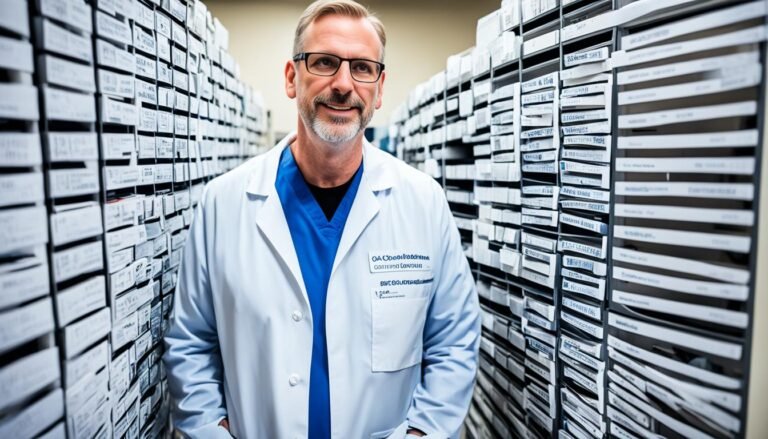Top Benefits of a Doctorate in Health Studies
Are you aiming to climb higher in the healthcare field? Maybe you wish to master health’s ins and outs and boost your income? A Doctorate in Health Studies could be your way forward. It offers several significant benefits for those seeking advanced knowledge.
If you’re wondering how long it takes to reach this level in healthcare, you might want to first consider how long is medical school.
This piece will detail the top advantages of a Doctorate in Health Studies. It shows how this degree can supercharge your healthcare career. Whether you dream of leading or diving into research, or you just want to expand your field smarts, this option is sure to deliver.
Key Takeaways:
- Advanced healthcare knowledge is one of the top benefits of pursuing a Doctorate in Health Studies
- Career advancement in healthcare is more accessible with a higher level of education
- Research opportunities and specialized expertise in health are available to graduates of this program
- A Doctorate in Health Studies enhances job market competitiveness
- Academic credibility and leadership positions in healthcare can be achieved with this degree
What is a Doctor of Health Science?
A Doctor of Health Science (DHSc) is a special degree. It helps students get ready for top health jobs and teaches practical skills for use in the real world. Unlike a Ph.D., DHSc programs focus on leadership roles in the healthcare field.
Students in DHSc programs learn a lot about healthcare systems and how they work. This helps them make smart choices and improve things. They learn skills like how to do research, analyze data, make policies, and plan strategies. These skills are a great start for a successful career in health leadership.
The DHSc degree helps graduates understand and improve the changing healthcare world.
The DHSc degree is great because it opens many job doors. Graduates can work in health management, advise, lead in schools, make health policies, or do research. This variety lets people follow their passion and have a big impact where they care about.
Also, DHSc programs often include chances to work in real healthcare settings. This could be through internships, externships, or with a mentor. These hands-on opportunities help students use what they’ve learned in a real setting. It makes them even more ready for working in healthcare.
Finishing a Doctor of Health Science program really sets people apart when looking for jobs. They show they have expert knowledge and are serious about getting better at what they do. Healthcare employers really value the practical and leadership skills that DHSc graduates bring. This makes them stand out for important roles.
Basically, a DHSc degree can lead to an exciting and influential career in health management. It gives both solid theory and practical skills. This helps graduates have a real effect on healthcare’s future.
The Practical Training in DHSc Programs
Practical training in DHSc programs is key for making strong health leaders. This can include:
- Internships or externships at healthcare organizations
- Mentorship programs with experienced healthcare professionals
- Working on projects with industry partners
These hands-on experiences show DHSc students the real-world challenges in healthcare. They get to practice their skills in real settings. This makes them better leaders and innovators.
DHSc students also get to meet people already working in their area of interest. This networking can bring chances for internships, jobs, or research when they graduate. It really boosts their career chances.
Specialized Curriculum in DHSc Programs
DHSc programs get students ready for top jobs in healthcare. They learn all about the U.S. healthcare system, as well as global health. Other key parts are research and how to handle healthcare data.
Students also get to pick what they want to focus on. This makes their skills stand out in the job market. For example, they might focus on improving how healthcare is provided.
Here are some options students might choose:
- The Clinician Track: Great for those in healthcare who want to be leaders. They learn to make decisions backed by evidence and how to improve the quality of care.
- The Education Track: This track is for people who want to teach others in healthcare. They learn about creating lesson plans and how to evaluate what students learn.
- The Clinical Nutrition Track: For nutrition enthusiasts, this track explores how food impacts health. It includes studying nutrition on a population level and in clinical settings.
These choices allow students to focus on their career goals. DHSc programs make sure graduates are ready for the jobs they want. They tailor their learning to meet the latest healthcare needs.
Career Opportunities with a Doctor of Health Science
Having a Doctor of Health Science (DHSc) degree opens many doors. Graduates can choose from various roles in healthcare. They can influence healthcare outcomes and lead evidence-based care practices.
One path is medical and health services management. As managers, DHSc graduates ensure healthcare places function well. They focus on quality patient care and smart resource use.
Another option is to be a health educator. DHSc holders help communities learn about health. They encourage making healthy choices to prevent diseases.
Clinical research is also a thrilling field. Here, DHSc grads study and solve healthcare problems. They need top-notch research skills to make a difference in healthcare.
“A DHSc degree prepares you for many healthcare jobs. From managing services to educating others and doing research, there are many paths.”
DHSc grads can also work in consulting, policy, or education. Their deep knowledge helps healthcare grow and change for the better.
With a DHSc, grads are ready for the healthcare world. They have skills, knowledge, and leadership. This makes them key players in healthcare settings.
Job Satisfaction in the Health Science Field
A career in health science brings a lot of joy. People with a DHSc degree can help improve health. They can work with communities and teach others about health. Their work shapes healthcare policies and leads to better patient care.
Health science has many job options. With a DHSc, you can follow your dreams. Some lead in healthcare while others teach. Doing what you love brings happiness and satisfaction in your work.
“I love merging healthcare and teaching,” says Dr. Maria. “Helping students who will be in healthcare feels amazing. I enjoy supporting their journey, knowing I’m shaping healthcare’s future.”
“Healthcare lets me affect lives positively,” shares Dr. Jonathan. “My research aims to better health services for all. Making healthcare fairer is my goal.”
Happiness at work in healthcare comes from meaningful tasks. The DHSc degree helps you advance. You learn new things to be better at your job. This learning keeps the job exciting and fulfilling.
Healthcare jobs are often secure. There’s always a need for healthcare workers. This means there are many jobs available. Knowing you make a difference adds to your job’s joy and reward.
The Impact of Job Satisfaction on Healthcare
Happy healthcare workers make better care. They feel valued and do their best for patients. They are less likely to get tired, which is good for them and their patients.
When healthcare workers are happy, patients are too. They offer better care and connect with patients. This leads to happier patients and better health for all.
Being happy at work in healthcare is important for everyone. It makes the whole system better. Doctors with a DHSc degree shape the future. They bring new ideas and better care for patients.
| Benefits of Job Satisfaction in the Health Science Field |
|---|
| 1. Improved patient outcomes |
| 2. Enhanced patient satisfaction |
| 3. Lower levels of burnout and improved well-being |
| 4. Increased innovation and advancement in healthcare |
| 5. Positive impact on healthcare policies and practices |
Being happy at work in health science means a lot. It’s not just about you being happy. It changes healthcare for the better. DHSc graduates find deep satisfaction in their careers. This leads to better care, more innovation, and a kinder healthcare system.
Job Growth in the Health Science Field
The health science field is set to grow a lot. The Bureau of Labor Statistics says healthcare jobs will increase by 13%. This means there will be around 2.4 million new jobs. It’s great news for anyone looking to build a career in health science, especially with a DHSc degree.
The need for healthcare is growing, so those with a DHSc will find many job options. They could become healthcare admins, research experts, public health advisors, or teachers.
Getting a DHSc degree means you stand out in the job market. You’ll have the skills and knowledge needed in today’s healthcare world.
More people living longer and needing better healthcare is making jobs in health science increase. This field is looking for people who can research, set health policies, and provide top-notch care.
Having a DHSc makes you a key player in healthcare. You can use your education to help healthcare grow and make patient care better.
“Health science will see a big jump in job chances. Those with a Doctor of Health Science will find many paths for career progress.”
Lucrative Salary in Health Science Careers
Professionals with a Doctor of Health Science (DHSc) degree can earn a lot. They are respected in health sectors due to their special skills. The healthcare industry values them highly.
The Bureau of Labor Statistics says medical and health managers make about $104,280 yearly. But, this number changes based on where they work, their experience, and the role they have.
Leadership roles often pay more in the healthcare sector. As these experts move up, they can earn more. This means getting a DHSc degree can lead to good earnings over time.
High-Earning Potential in Health Science Careers
| Health Science Career | Average Salary |
|---|---|
| Medical and Health Services Managers | $104,280 per year |
| Health Educators | $57,660 per year |
| Clinical Researchers | $91,510 per year |
| Healthcare Administrators | $115,160 per year |
A DHSc degree leads to top-paying jobs in health science. Roles like managing health services, educating about health, or researching can pay well. Healthcare administrators also see good pay, making it a great career path.
With skills in leading, researching, and managing healthcare, DHSc holders can find well-paid jobs. They have many opportunities for financial and career growth.
“A Doctor of Health Science degree not only provides a fulfilling career but also offers a highly competitive salary, making it an excellent choice for individuals passionate about making a positive impact in the field of healthcare.” – Dr. Emily Miller, DHSc.
Job Flexibility in the Health Science Field
Professionals with a Doctor of Health Science (DHSc) degree can explore many career options. This advanced degree broadens their job possibilities. They can pick careers that interest them, leading to a fulfilling career journey.
DHSc graduates may choose a career in healthcare administration. They lead in hospitals, clinics, or with insurance companies. They use their knowledge to improve how healthcare is delivered.
Teaching is another path for DHSc graduates. Sharing knowledge in colleges helps mold the future of healthcare. It’s a rewarding way to give back and participate in future developments.
“The flexibility provided by a DHSc degree allows professionals to explore different roles throughout their careers and make transitions as their interests and goals evolve.”
For those who prefer research, a research career might be appealing. DHSc graduates work in places like research institutions or pharmaceutical companies. They focus on studies that can change healthcare for the better.
Those interested in consulting can also find a place. Their health science knowledge is valuable in advising on patient care or efficiency. They provide sharp insights to support better healthcare outcomes.
With a DHSc degree, professionals can find flexibility in various health science roles. This includes administration, teaching, research, or consulting. They can adapt and keep growing, contributing to healthcare’s improvement.
The Benefits of Job Flexibility in Health Science Careers
Job flexibility means DHSc professionals can enjoy several advantages:
- Professional Growth: Job flexibility allows for new skills and expertise, boosting growth.
- Work-Life Balance: Choosing roles that fit one’s life helps with balance.
- Adaptability: Being flexible means staying relevant in a changing industry.
- Learning Opportunities: Moving between different roles offers varied experiences and learning.
- Networking: Exploring different paths helps build a strong healthcare network.
DHSc graduates can mold their careers to fit their values and goals. The array of career paths ensures they find purpose and success in health science.
The Difference Between a DHA and a Ph.D.
DHA and Ph.D. degrees in healthcare have key differences. While both are respected, they lead to different career paths. Let’s explore these differences.
The DHA, or Doctor of Health Science, is hands-on and practical. It’s for those wanting leadership roles in healthcare. DHA grads learn to manage complex systems and make a big difference. They study healthcare administration, leadership, planning, and policies.
On the other hand, a Ph.D. in healthcare is about deep research and teaching. Ph.D. programs aim to create new knowledge in a field. People with a Ph.D. often become researchers or professors, impacting healthcare through their studies.
Choosing between a DHA and Ph.D. depends on career goals. A DHA is for leadership. A Ph.D. is if you love research and teaching. Each offers valuable opportunities in healthcare.
Key Differences Between DHA and Ph.D. Programs
Let’s look closer at the key differences between a DHA and a Ph.D.:
| DHA | Ph.D. |
|---|---|
| Applied and practical focus | Research and academic focus |
| Leadership positions in healthcare | Research and teaching careers |
| Healthcare administration and policy coursework | Research methodology and analysis coursework |
| Strategic planning and organizational leadership | Original research and scholarly work |
It’s important to know what each degree focuses on. This helps you choose the right path for your career goals.
Conclusion
Earning a Doctorate in Health Studies is great for those keen on healthcare. It boosts your expertise, helps you climb the career ladder, and makes you a health specialist. Those with this degree excel in leading roles, push forward with research, and better the healthcare field.
A Doctorate in Health Studies opens many doors. It lets you aim for top healthcare posts, where you can lead, inspire change, and influence the industry’s future. The skills and know-how you gain are in high demand, improving your chances for better career progress.
Plus, the health sector is growing fast, needing more leaders. With a Doctorate, you can land fulfilling roles with good pay. This degree leads to a gratifying career that’s also promising and financially rewarding.







